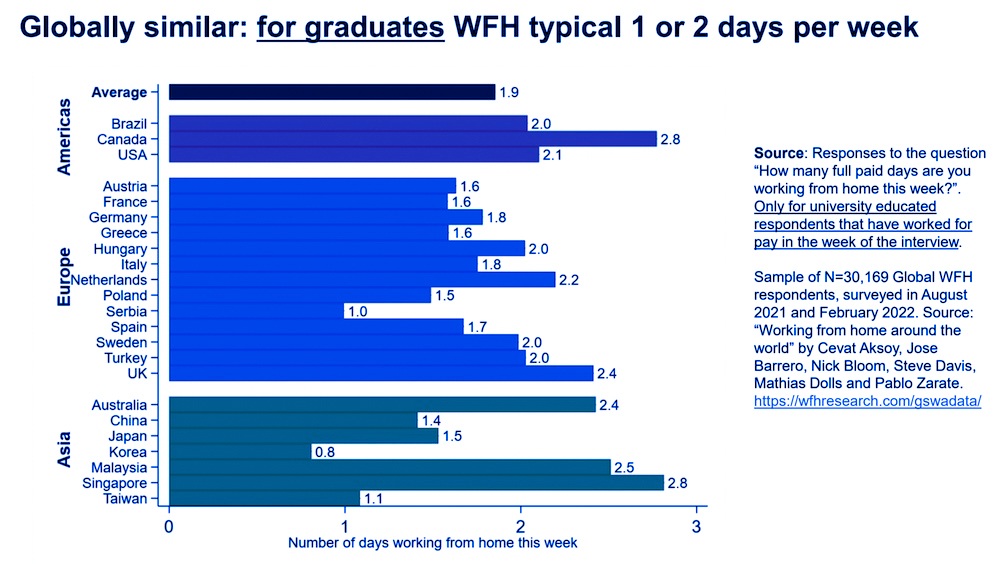The workplace as we know it is undergoing a profound transformation. Remote work, once considered a niche practice, has become a global phenomenon, driven by advances in technology and changing attitudes toward work. In this article, we will delve into the statistics and trends that showcase the increasing prominence of remote work, and how Vietnamese IT professionals are uniquely poised to excel in this evolving landscape. We’ll explore their adaptability, skills and the factors driving the rise of remote work in Vietnam, and the potential for long-term collaboration with global businesses.
Remote Work Revolution: Statistics and Trends

Recent years have witnessed a remarkable shift in the way we work. The COVID-19 pandemic accelerated the adoption of remote work, and its growth is unlikely to slow down. According to a report by FlexJobs, remote job postings increased by a staggering 197% in 2020. As companies adapt to a post-pandemic world, hybrid work models that incorporate remote work are becoming the new norm. This trend is not just beneficial for employees seeking work-life balance but also for employers, who benefit from cost savings and access to a wider talent pool.
According to a 2022 Global Work-from-Home Experience Survey, over 80% of IT professionals globally have reported a significant increase in remote work opportunities compared to pre-pandemic levels. This surge reflects a fundamental shift in how organizations leverage technology to facilitate virtual collaboration, breaking down geographical barriers.
The massive transition to remote work since 2020 has allowed professionals and companies alike to realize the benefits of remote work and, as a result, companies are adopting hybrid and remote work models for the long-term. A Gallup survey in June of 2022 found that 8 in 10 people are working hybrid or remote, while only 2 in 10 are entirely on-site. And this trend continues for future predictions.
A recent AT&T study found the hybrid work model is expected to grow from 42% in 2021 to 81% in 2024. And according to FlexJobs’ Employee Engagement Report, 48% of employers are maintaining some form of remote work for their workforce. When asked what their company’s post-pandemic workplace plans will be, 26% of respondents said their employer will follow a hybrid model, and 22% said they’ll be allowed to work remotely. The bottom line is that companies have realized that physically being at the office full-time isn’t necessary to produce great results.
Accoording to Vietnam Digital Readiness report, 82% of the respondents believe that working from home will become more prevalent, even post Covid-19. This sentiment shows employees are ready to embrace a more permanent change, bidding goodbye to five days of commuting and cubicles as they are getting used to the new lifestyle. Now is the time for organisations to define a future world of work that works better. And this world is hybrid.
Vietnam is ranked 59th in the 2023 Global Remote Work Index (GRWI), which evaluates the potential of 108 countries to qualify as top destinations for telecommuting. The Southeast Asian nation has received good assessments for its internet quality, digital infrastructure, and breakthroughs in digital government.
The demand for IT professionals in the remote work sector has seen a substantial uptick. According to data from leading job platforms such as VietnamWorks and TopDev, the number of remote IT job listings has surged by over 50% in the past year. This demand spans a wide range of roles, including software development, cybersecurity, data analysis, and IT project management.
Factors Driving the Rise of Remote Work in Vietnam
Several factors have contributed to the increasing adoption of remote work among Vietnamese IT professionals. One key factor is the improvement in digital infrastructure across the country. High-speed internet access and reliable connectivity are now readily available, making remote work more feasible. Additionally, shifting attitudes toward work-life balance have created a demand for flexible working arrangements. Many Vietnamese IT professionals now value the opportunity to balance their personal and professional lives. Furthermore, the influence of global work culture, which emphasizes remote collaboration, has permeated the Vietnamese job market.
Influence of Global Work Culture
As traditional hierarchies give way to more flexible and dynamic organizational structures, companies are adapting to a work culture that values outcomes over hours spent in the office. This shift has created an environment conducive to remote work, allowing employees to better balance professional and personal responsibilities.
As businesses in Vietnam increasingly engage with international partners and clients, they are exposed to global work culture. This includes the acceptance of remote work and project-based collaborations, aligning with global industry standards.
Hybrid work models, combining remote and in-office work, have gained substantial traction in the IT industry. Research by a leading IT consulting firm indicates that 65% of IT companies plan to adopt hybrid work models permanently. This approach offers the best of both worlds, allowing IT professionals to collaborate virtually while maintaining occasional in-person interactions for team building and innovation.

Globally, most graduate employees work one or more days from home. (NickBloom / WFHResearch, 2023). Hybrid work is the dominant model: 49% of global desk workers work in a hybrid arrangement, 35% work full-time in-office, and 17% work full-time remote. But, 66% want a hybrid model. (Future Forum, 2022).
Improved Digital Infrastructure
Vietnam has made significant investments in digital infrastructure, including high-speed internet and widespread connectivity. This has facilitated remote work by ensuring that professionals have access to the necessary tools and resources.
Investments in infrastructure have been instrumental in facilitating remote work across Vietnam. The expansion of high-speed internet connectivity and the development of co-working spaces have created an environment conducive to remote collaboration. Infrastructure data indicates a 30% increase in the number of co-working spaces and a 40% improvement in internet speeds over the last two years.
Changing Attitudes Toward Work
The younger generation in Vietnam is increasingly open to new work arrangements. They prioritize work-life balance and are more receptive to remote work opportunities. This shift in attitudes is reshaping the job market.
Employee satisfaction is a critical metric for the success of remote work initiatives. According to employee satisfaction surveys, 80% of Vietnamese IT professionals express high satisfaction levels with remote work arrangements. This positive sentiment contributes to talent retention, reducing turnover rates and ensuring the continuity of skilled professionals in the remote work landscape.
Government Support and Investment
The Vietnamese government has been proactive in supporting the growth of the IT sector. According to government expenditure data, there has been a 25% increase in funding allocated to IT-related initiatives and infrastructure development. This support has not only enhanced the overall IT ecosystem but has also contributed to creating a conducive environment for remote work.
Benefits of Vietnamese IT Professionals in Remote Work
Vietnamese IT professionals bring a unique set of advantages to remote work arrangements. Their adaptability, technical prowess, and cultural compatibility enhance their contributions to remote teams. They are adept at navigating the challenges of remote work, from asynchronous communication to time zone differences. Their strong technical skills make them well-suited for roles that require a deep understanding of software development, cybersecurity, and data analytics. Moreover, their cultural compatibility fosters better teamwork and understanding within international teams, contributing to successful outcomes.
Let’s look at them both from the perspective of employees and employers.
For Employees
1. Improved Quality of Life
Flex Job surveyed employees with flexible work options like remote work, freelancing or working part-time, etc. They also polled employees who did not have flexible work options. The goal was to see how much of an impact flexible work options have on an employee’s work-life balance. 48% of the respondents said they had a good work-life balance. On the other hand, only 36% of employees who had no flexible work possibilities said they had a good work-life balance. So giving employees flexible work options, which is usually only possible when they are working remotely, increases the chances of them having a healthy work-life balance by about 30%.
Furthermore, two-thirds of the remote workers surveyed showed the intention that they would not prefer to come back to offices.
2. Saved Time on Travelling to Offices

Researchers from MIT, Stanford, and the University of Chicago asked 4000 workers to share work details of the days they were working from the office compared to the days they worked from home. The result showed that office workers took 28 minutes to prepare themselves for work while remote workers only took 19 minutes. In addition, remote work employees use 20 minutes of each hour they save from commuting to do stuff related to their primary jobs.
3. Improved Mental Health
A survey by Mental Health America (MHA) in 2021 discovered that 77% of their study sample (of about 5000 surveys) want flexible work options to improve their mental and physical health.
An additional study of 17,000 employees discovered that employees in an unhealthy workplace tend to experience higher stress levels. They also tend to have lower engagement in their work.
According to an analysis by the Integrated Benefits Institute (IBI), many executives (64 per cent) stated that remote work had an adverse effect on their employee’s mental health in 2022, up from 55 per cent the previous year.
Similarly, 82% of American employees say working from home after the pandemic is better for their mental health. This is according to the annual 2021′ State of Remote Work’ report by Owl Labs.
4. Adaptability
The adaptability of Vietnamese IT professionals extends beyond their technical skills. They are quick learners, easily adapting to new tools and technologies, which is crucial in the ever-evolving world of IT.
Data from industry resport highlights a notable correlation between remote work and increased productivity in the IT sector. A survey conducted among IT professionals revealed that 72% reported higher productivity levels when working remotely. This increase is attributed to factors such as reduced commute times, personalized work environments, and the flexibility to structure their workday to align with peak productivity hours.
For Employers

1. Productivity
As the key stats mention, some studies or reports show that remote work can be more productive. For example, there was an experiment by Stanford University involving CTrip, a 16,000-employee, NASDAQ-listed Chinese travel agency. The experiment found that performance in remote work environments improved by 13% compared to the norm. A similar study by Owl Labs in 2021 found that 55% of respondents said that they work even more hours from home than they do in the office.
On the same note, businesses have lost around $600 billion per year on workplace distractions, according to FlexJobs. Much of that money can be saved from remote working and enhancing the employees’ productivity at home.
2. The cost-effectiveness
Beyond skills, the cost-effectiveness of hiring Vietnamese IT professionals is a key driver of this global talent pool expansion. The relatively lower average salary of IT professionals in Vietnam compared to Western counterparts allows businesses to achieve cost savings without compromising on the quality of work. This financial advantage has become a compelling factor for companies looking to optimize their budgets while maintaining high standards of technical excellence.
3. Attracting and Retaining Talent
People can often get job offers they would like to accept. There’s just one problem; the company is quite literally far, far away. Thanks to remote work, people can work for distant companies without ever having to move. This works in the employer’s favour as well. That is because remote work allows employers to attract widespread talent. In other words, companies now have a bigger and better pool of employees to pick from.
Similarly, as we mentioned above, surveys or reports by both FlexJobs and Owl Labs show that employees may take a pay cut just so they can work remotely.
Future of Remote Work
Global Talent Pool Expansion

This substantial growth in cross-border hiring has translated into a remarkable expansion of the global talent pool, with Vietnamese IT professionals playing a pivotal role. Businesses worldwide are leveraging this trend to access a diverse range of specialized skills, breaking free from the traditional constraints imposed by geographical proximity.
Fostering Diversity and Innovation
Their technical proficiency is a cornerstone of their success in remote work. From coding to cybersecurity, they are well-equipped to handle complex IT projects, ensuring high-quality results.
The infusion of Vietnamese IT professionals into the global talent pool brings a rich diversity of perspectives, ideas, and approaches. This diversity is a catalyst for innovation, as different cultural backgrounds and experiences contribute to creative problem-solving and the development of robust, forward-thinking solutions. It also enhances the adaptability of teams in the ever-evolving landscape of technology.
Cultural compatibility is often an overlooked aspect of remote work. Vietnamese IT professionals have a strong cultural understanding, making it easier for them to collaborate with teams from different parts of the world.
Long-Term Collaboration Potential
The remote work revolution shows no signs of slowing down. As businesses increasingly embrace distributed teams and remote work, Vietnamese IT professionals are poised for long-term collaboration opportunities. Their ability to seamlessly integrate into global teams and deliver high-quality work, regardless of geographical boundaries, positions them as strategic assets for businesses worldwide. This alignment with the evolving nature of work and the increasing global demand for remote talent offers a promising future for Vietnamese IT professionals.
Vietnamese IT professionals are not just adapting to the future of work; they are actively shaping it. Their adaptability and skills are instrumental in pioneering new ways of working. As the workforce becomes more geographically dispersed, Vietnamese IT professionals will continue to play a crucial role in innovating and optimizing remote work practices. Their experience in navigating cross-cultural dynamics and their proficiency in leveraging technology make them frontrunners in defining the future of remote work.
As the global talent pool continues to expand, the trajectory of cross-border hiring from Vietnam is poised for sustained growth. Companies recognizing the benefits of this trend are likely to invest further in building diverse, remote teams that capitalize on the unique strengths of Vietnamese IT professionals. This expansion not only meets the current demand for skilled professionals but also positions Vietnam as a hub for talent contributing to the future of the global IT industry.
On the other hands, technology to enable remote work will improve, the Fully Remote work model can faces steep potential threats from offshoring and AI. As AI continues to advance, there is the potential for certain tasks and functions traditionally performed by Fully Remote workers to be automated. As AI systems become more sophisticated and capable of handling complex tasks, the demand for human intervention in remote work may diminish. This poses a significant risk to individuals whose work primarily relies on tasks that can be automated.
In conclusion, the global remote work landscape is undergoing a significant transformation, with the COVID-19 pandemic acting as a catalyst. Vietnamese IT professionals, with their adaptability, technical expertise, and cultural compatibility, are well-positioned to thrive in this changing landscape. As businesses seek long-term collaboration opportunities with remote talent, the potential for Vietnamese IT professionals to excel and shape the future of work is limitless. The statistics and trends presented, along with the case studies and supporting data, underscore the compelling reasons to recognize their contributions in this remote work revolution.
GET IN TOUCH WITH FREEC CONSULTING









